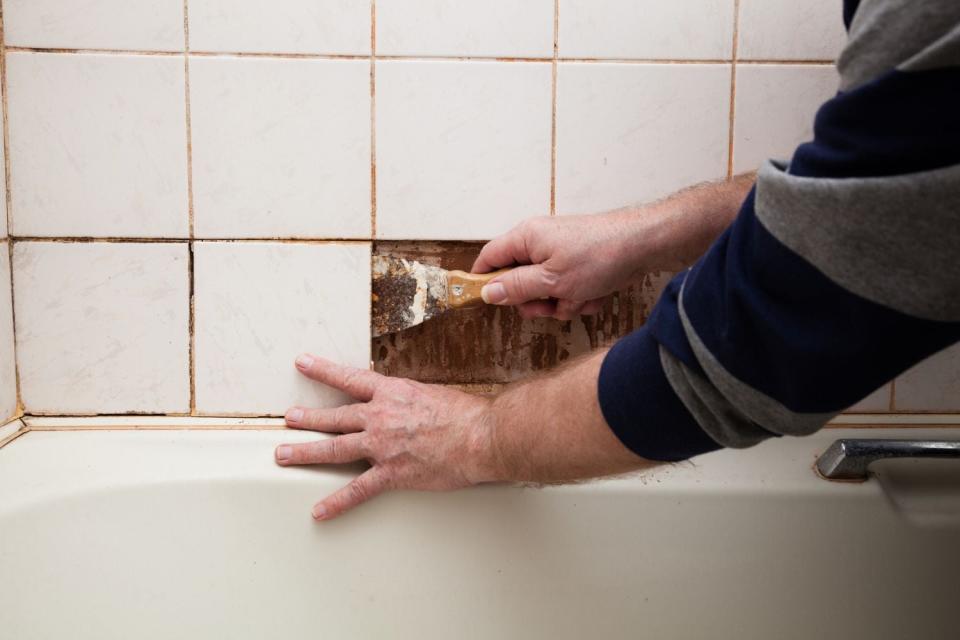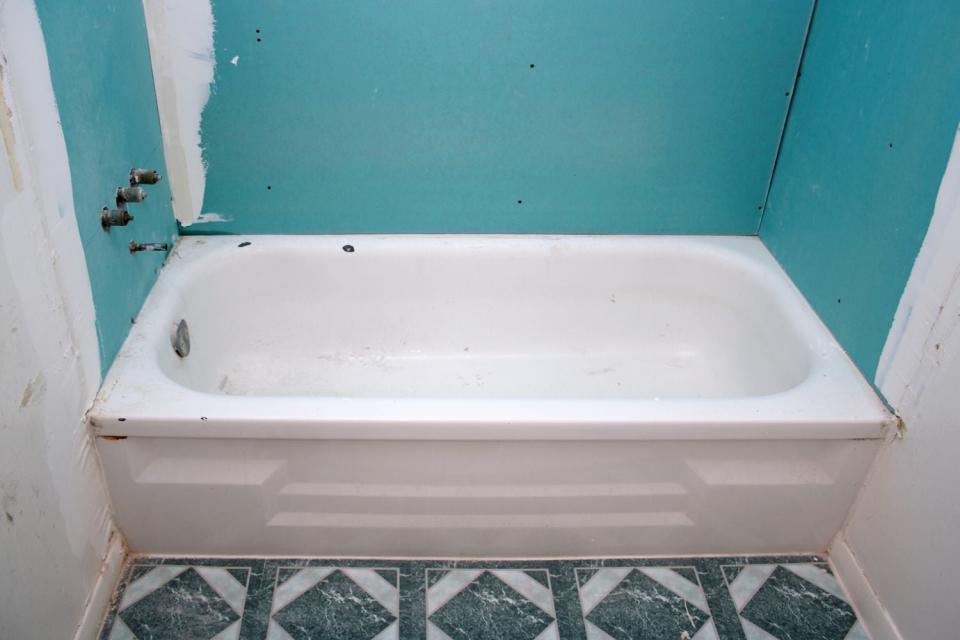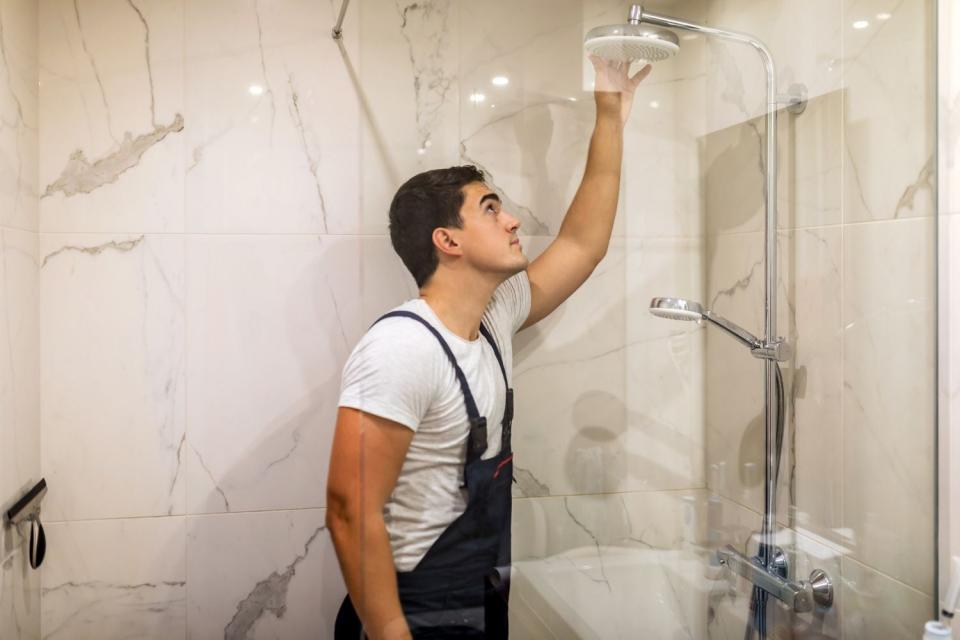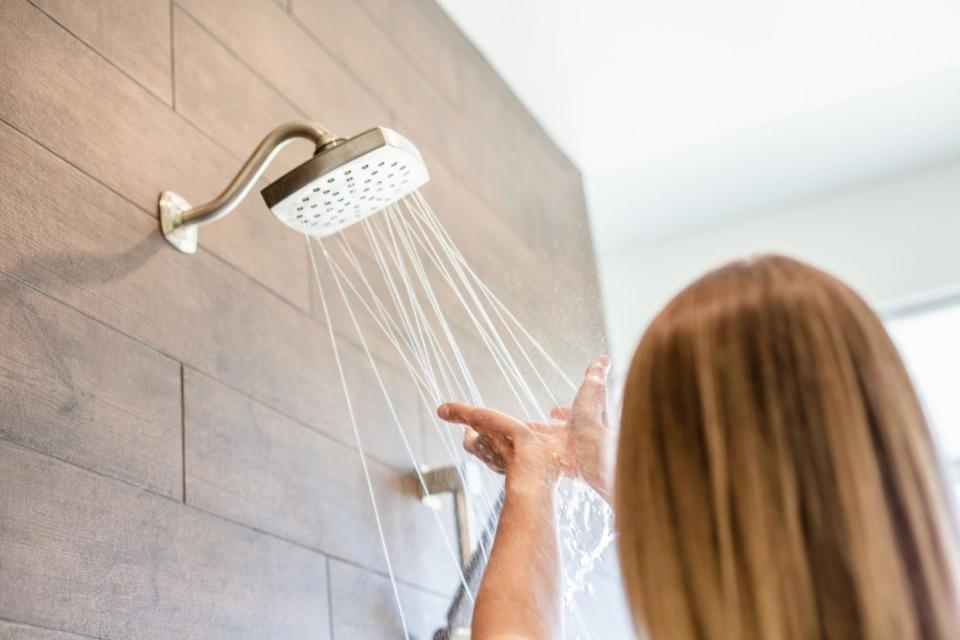How Much Does a Tub-to-Shower Conversion Cost?

Highlights
A tub-to-shower conversion typically costs between $1,200 and $8,000, with a national average of $3,000.
Some of the factors that determine the exact cost include the shower size and material, the type of conversion chosen, and the costs to remove and dispose of the old tub.
Converting a bathtub to a shower can help homeowners make better use of their space, while also reducing water bills and improving accessibility.
Because a tub-to-shower conversion is an extensive project requiring demolition, drywall installation, framing, and plumbing, this is a task best left to a professional.
Find trusted local pros for any home project

+

An old, outdated bathtub can feel more like a nuisance than a helpful feature. Converting an old tub to a shower can not only modernize a space, but it can also provide a more efficient and convenient way for the homeowner, residents, and guests to bathe. Whether a homeowner is looking to save on water bills, make their bathroom more accessible, or simply wants a more stylish and functional space, a tub-to-shower conversion might offer the perfect solution.
According to Angi and HomeAdvisor, tub-to-shower conversion cost ranges from $1,200 to $8,000, with the average cost of tub-to-shower conversion around $3,000. A tub-to-shower conversion replaces a traditional bathtub with a standing shower. There are a number of factors that impact the cost, including the shower’s size, style, materials, conversion type, and other factors detailed in this cost guide. Additionally, this guide describes the different types of tub-to-shower conversions, the benefits of the project, and how homeowners can hire the best tub-to-shower conversion contractors for the job.

Photo: istockphoto.com
Factors in Calculating Tub-to-Shower Conversion Cost
Converting a tub to a shower offers many benefits, but before exploring tub-to-shower conversion ideas, it is important for homeowners to understand the factors covered below that contribute to the overall cost. This can give them a general idea of what to expect so they can set a realistic budget for the project.
Shower Size, Style, and Material
The three main factors that affect tub-to-shower conversion costs are the size of the shower, the style of the shower, and the types of materials used. First and foremost, the size of a shower affects the price. Large showers require more materials and more labor hours to build, which contributes to a larger overall cost.
As far as shower styles, a homeowner will generally choose between a prefabricated shower unit or a custom-tiled shower. Prefabricated units are less expensive because they are easier to install. With a custom-tiled shower, more effort is required to install the tile backing and grouting, not to mention the placement of each individual tile.
When choosing a tiled shower, a homeowner can pick less-expensive materials such as ceramic tile, which costs around $0.50 per square foot, or more-expensive materials such as marble or porcelain tile, which costs around $15 or more per square foot. Homeowners will want to consider both the quality of materials and the size and style of their shower to estimate the total cost.
Conversion Type
In most cases, homeowners turn their bathtub into either a walk-in shower, a shower stall, or a tiled shower. Each of these tub-to-shower conversion types has a different associated cost. The least-expensive option is a shower stall, which ranges from $1,000 to $8,000. Shower stalls are prefabricated units that come in one or four pieces and are quickly installed, resulting in a lower price point. A walk-in shower costs $800 to $15,000, and a tiled shower costs $3,500 to $15,000. Walk-in showers can also be tiled showers, hence the similar price points. These types of showers can be made with cheap or expensive tiles and can be small or large, all of which will affect the total cost.
Tub Removal and Disposal
Removing and disposing of the old bathtub is the first step of a tub-to-shower conversion project. The cost to remove and dispose of a tub is between $150 and $300. Large tubs or very heavy antique claw-foot tubs could cost more than $300 to remove due to the extra effort needed. The cost of walk-in tub removal may be higher as this type of tub tends to be larger than a standard tub. Navigating the old tub through tight doorways or narrow stairways can add complication to the disposal process and push the cost up above the higher end of the range. Homeowners may also have to pay $300 to $800 for cleanup and wall repairs after the tub is removed.
Shower Stall, Faucet, and Door Installation
Once the old tub is removed and any repairs are made, the new shower’s stall, faucet, and door can be installed. A prefabricated shower stall kit will cost anywhere from $1,000 to $8,000 for materials and installation—this includes shower walls and a floor and is typically cheaper than a custom-tiled shower. These kits most often do not come with the necessary faucet or shower door, so homeowners will need to plan to pay for these features separately. A shower fixture set including the faucet and shower head costs from $50 to $900. The more-expensive shower fixtures have added features like multiple spray options and temperature controls. A shower door will cost $600 to $1,350 depending on the framing material and whether it is sliding, hinged, or fixed.
Geographic Location
Changing a tub to a shower will be more expensive in some geographic locations than in others. This often has to do with the cost of living as well as the demand for plumbers and general contractors in the local area. Shower remodel costs will be more expensive in areas with a higher cost of living that have more demand for contracting work. The following are the average costs to replace a bathtub with a shower in some cities around the country.
City | Average Cost |
Raleigh, North Carolina | $8,858 |
Dallas, Texas | $7,355 |
Phoenix, Arizona | $7,252 |
Kansas City, Missouri | $5,332 |
Chicago, Illinois | $4,568 |
New York City | $3,890 |
Sacramento, California | $2,478 |
Additional Costs and Considerations
In addition to the cost factors explained above, there are a few more that could apply in some situations. The following information will help homeowners understand the cost of additional work related to a tub-to-shower conversion project.
Prefabricated vs. Custom Shower
A prefabricated tub-to-shower conversion kit only costs $1,000 to $8,000 compared to a custom shower which can cost $3,500 to $15,000. Prefabricated units only come in certain sizes, so homeowners will need to frame the walls in their bathroom accordingly, and they may not get as big a shower as they would like. The advantage is the lower cost of prefabricated walls. A custom shower can be the exact size and shape that a homeowner wants in their bathroom, but it will come at a higher price point. If both options sound ideal, there is a middle ground: A homeowner can use a prefabricated shower pan or floor and then custom-tile the shower walls. A shower pan costs anywhere from $500 to $3,500.
Repairs
There may be other requirements during a tub-to-shower conversion project, typically plumbing repairs or layout modifications. Homeowners can expect to pay between $300 and $2,400 for any additional work in their bathroom. If the work is exclusively related to plumbing, a plumber will charge around $90 per hour. It is a good idea for homeowners to have all necessary bathroom repairs completed at the same time as another project because ultimately it will save money in labor costs. Homeowners can research bathroom renovation costs in addition to tub-to-shower conversion costs to get an idea of what they can expect to pay in total.
Accessibility and Safety Feature Installation
Some homeowners choose to convert their tubs to a shower for accessibility reasons. Mobility issues can make it difficult to climb over the side of a bathtub into a shower each day. There are other features that can be installed in a shower to improve overall safety including shower bars, seats, and liners. A shower seat or bench costs $200 to $500, and grab bars or handrails cost $25 to $370.
Customizations
When a homeowner is installing a new shower, there are plenty of opportunities for customization. Customizations can include unique tile designs, shelves or niches, a custom shower shape, and more. Any customizations beyond the base design will increase the cost, so homeowners will want to keep this in mind as they plan their dream shower design. For example, a shower shelf, niche, or bench ranges from $200 to $500.
Additional Plumbing Work
There is always a chance additional plumbing work will be necessary when a homeowner is converting a tub to a shower. The project will include swapping out shower fixtures and installing a shower head; however, additional plumbing work, like replacing outdated pipes and valves, may also be required. The cost of this plumbing work can range from $500 to $1,100. Replacing an old and outdated shower valve with one of the best shower valves costs between $225 and $575.
Mold Remediation
When a bathtub is removed from a bathroom—particularly an older bathroom—there is a chance the contractor will find mold. Small issues will not have too much of a budget impact, but larger issues could require mold remediation that significantly increases the bathroom remodel cost. Mold or mildew caused by water damage can rot wood framing or drywall in addition to creating health concerns. Mold remediation costs for a bathroom range from $500 to $1,000 depending on the severity.
Permits
In most cases, a tub-to-shower conversion project will require a building permit to complete. This is due to the plumbing modifications required. A building inspector must check these modifications to ensure they are correct and up to code. The cost of a building permit ranges from $180 to $2,000 depending on the scope of the project and where it’s located. Homeowners can speak with their contractor to determine whether a building permit is required and what it will generally cost.

Photo: istockphoto.com
Types of Tub-to-Shower Conversions
There are three types of showers homeowners can choose from when converting a tub to a shower: a walk-in shower, a shower stall, or a tiled shower. The details and pricing for each tub-to-shower conversion option are explained below.
Walk-in Shower
A tub-to-walk-in shower conversion costs anywhere from $800 to $15,000. This type of shower does not have a door, offering a more spacious feel and better accessibility for those with physical limitations. Walk-in showers can be made in many materials and sizes, hence the wide price range. Prefabricated walk-in shower units are found at the low end of the price range, while large, custom-tiled walk-in showers are at the high end.
Shower Stall
Replacing a tub with a shower stall costs between $1,000 and $8,000. Shower stalls are most often prefabricated and come in a kit that includes the walls and floor. Extra features like a shower seat or glass door will add to the overall cost. There are various shower stall shapes for homeowners to choose from, with each having different prices as follows:
Square corner shower stall: $350 to $1,400
Round corner shower stall: $500 to $1,300
Rectangular shower stall: $500 to $2,300
Curbless shower stall: $2,000 to $4,100
Tiled Shower
Tiled showers have walls and a floor covered in tiles. Converting a tub to a tiled shower will cost between $3,500 and $15,000, but this price ultimately depends on the square footage of the shower. Homeowners can expect to pay $25 per square foot for materials and labor. Certain types of tiles will be more expensive than others—homeowners can choose ceramic tile to save money, and marble tile for a splurge.
Benefits of a Tub-to-Shower Conversion
There are many reasons a homeowner may want to swap out their tub for a shower, whether it’s to improve the look of their bathroom, make better use of space, or improve accessibility. These and other benefits of a tub-to-shower conversion are listed below.
Better Use of Space
In small bathrooms, a bathtub can take up a lot of valuable room in the layout. If the home’s residents aren’t frequently using the bathtub, it can feel like wasted space. A shower is often a better use of space, as it does not need to be as large as a tub. A tub can be 6 feet (or 72 inches) in length, while a small shower unit may be only 30 inches. Homeowners can make use of the extra space for much-needed storage or to give the bathroom a more open feel.
Reduced Water Bills
Taking a shower uses less water than taking a bath; therefore, a tub-to-shower conversion will usually reduce a home’s water consumption and water bills. This is not always the case if residents take very long showers; however, over time, showering is likely to save homeowners money compared to taking a bath.
Improved Safety
It is not uncommon for injuries to occur in a bathroom that are related to getting into the bathtub. People may slip and fall while navigating over the bathtub’s edge. Removing this obstacle and installing a shower will improve the safety of a bathroom. This is an especially important consideration if anyone in the household has mobility issues.
Easier Accessibility
Stepping into a walk-in shower is much easier for all people than getting into a bathtub, regardless of physical ability. The edge of a tub is notorious for causing slips and falls and can be a major obstacle for those with mobility limitations. A shower will have just a small curb or may even be curbless, making it simpler and safer to get in and out of.
Lower Maintenance
It is typically easier to keep a shower clean compared to a bathtub. Since the walls are straight and seamless, there are fewer edges where soap scum and debris can build up. Shower walls will resist mold and mildew growth and are somewhat self-cleaning as the water stream from the shower head makes contact with the wall and floor surfaces (though that does not mean homeowners can skip out on cleaning them altogether).
Improved Aesthetics
A beautiful walk-in shower tends to look more high-end than a basic bathtub. Homeowners have the ability to fully customize the shower and wall options rather than being stuck with just a rectangular tub. Searching for tub-to-shower conversion before-and-after images can help homeowners visualize the difference installing a shower might make to their bathroom.

Photo: istockphoto.com
Tub-to-Shower Conversion: DIY vs. Hiring a Professional
Shower stall kits may appear easy to install, but there is a lot more to the project than meets the eye. Replacing a tub with a shower requires demolition, drywall, framing, and most importantly plumbing skills that most homeowners do not have. Additionally, there is a lot that can go wrong if the plumbing is installed incorrectly. Sewer gases can back up from the drain, and water can leak from pipes. For these reasons, it is recommended that homeowners avoid DIY tub-to-shower conversion projects and hire a professional for the task instead.
A professional bathroom contractor can fully assess a tub-to-shower conversion project and offer their insight on the best type of shower to install. The best tub-to-shower conversion companies will have experience completing similar projects and will likely complete the project much faster than an inexperienced homeowner would. Homeowners will also want to keep in mind that some localities do not allow homeowners to complete this type of work themselves; instead, a licensed professional must complete the work as part of the permitting process. Skipping the professional and doing DIY plumbing work means the homeowner may need to rip out the shower and start the whole process over, which will dramatically increase the overall cost.
"Need
"Maybe

+

"}" data-sheets-userformat="{"2":769,"3":{"1":0},"11":3,"12":0}">
Converting your bathtub?
Maybe it's time to call in a bathroom renovation or remodeling pro. Get free, no-commitment estimates from experts near you.

+

How to Save Money on Tub-to-Shower Conversion Cost
A tub-to-shower conversion will cost thousands of dollars, so budget-conscious homeowners may be looking for ways to save money on the project. Check out these money-saving tips and determine if they are feasible ways to save money on your tub-to-shower conversion project.
Choose a prefabricated shower unit. Prefabricated shower units are less expensive than custom showers. While you will only have a limited selection of sizes and styles to choose from, as opposed to a custom shower that comes with unlimited options, it is a great way to save significant money.
Do the bathtub removal yourself. Not all homeowners can take on removing a bathtub themselves, but certain ones with construction experience may be able to. Be sure to fully research the process and grab a couple of people to assist with removing your existing bathtub in preparation for your new shower.
Have a flexible timeline. The fall and spring tend to be popular times for home renovation projects. Consider completing your project in the middle of summer or winter so there are more contractors available and you have options when it comes to the cost of services.
Consider hiring a tub-to-shower specialty company. There are many companies out there that specialize in converting tubs to showers. Some are able to complete these projects fast and at a reduced cost. Research these companies and ask about their one-day tub-to-shower conversion cost.

Photo: istockphoto.com
Questions to Ask About Tub-to-Shower Conversion
Before hiring a professional bathroom contractor to convert a bathtub to a shower, homeowners will want to be sure they properly vet the company. By asking the following questions, homeowners can get more information about the conversion process and make an informed hiring decision for their bathroom renovation project.
Do you offer free estimates?
Will you provide a written quote and contract?
Are you licensed and insured to complete this type of work?
How long have you been in business?
What kind of training do you offer for your employees?
Will the work be completed by an employee of your business or by a subcontractor?
Can you provide references from similar projects?
What size will the new shower be? Are there other layout options?
Can I see some of your tub-to-shower conversion pictures?
Do you recommend any other work in addition to converting the tub?
Do you foresee any mold remediation work or additional plumbing work?
Do you require a down payment, and if so, how much?
What is the payment schedule, and do you offer payment plans?
Do you offer products from specific brands? If so, what is your Kohler tub-to-shower conversion cost?
Do you offer a warranty on your work?
How soon can you schedule the work?
How long will the tub-to-shower conversion take?
Will this project require a building permit?
How can I get in touch with you while the project is in progress?
Do you take care of the cleanup after the project is complete?
How will you protect my home from damage during the project?
How do you handle disputes or disagreements?
FAQs
Before starting a tub-to-shower conversion project, it is important for homeowners to be knowledgeable about as much of the process as possible. The answers to the following frequently asked questions offer additional information on converting a bathtub to a shower.
Q. What should I consider when converting a tub into a shower?
Homeowners will want to consider the entire scope of the project when converting a tub into a shower. Do they want to have just a shower in their bathroom, or are they considering replacing the tub? Does the rest of the bathroom need to be remodeled during this process? Homeowners will want to think about how they use the space day-to-day and plan their tub-to-shower conversion accordingly.
Q. Is it cheaper to install a shower or a tub?
It costs a little more to install a shower than to install a tub. The cost to install a shower ranges from around $3,300 to $10,500, while the cost to replace a tub or install a new one ranges from around $4,150 to $10,850. A walk-in tub costs even more than a traditional tub, with a range of $4,000 to $20,000. The exact cost depends on the size of the shower or tub and the quality of the materials used.
Q. How do I find a professional installer?
To find a professional installer for a tub-to-shower conversion project, homeowners can start by asking their friends, family, and neighbors for recommendations. They may also want to research online for vetted bathroom contractors in their area. Ideally, the contractor will oversee the entire project and work directly with the plumber to coordinate work, taking those tasks out of the homeowner’s hands.
Q. Is it worth it to convert a tub into a shower?
Whether it’s worth it or not to convert a tub into a shower depends on when a homeowner plans to sell their home. If they will be living in the house for many years to come and prefer a shower over a tub, then it is worth it to convert as they will get a lot of use out of it. If a homeowner plans on selling their home within a few years, they will want to consider the pros and cons of marketing a home without a tub. While some buyers may prefer a walk-in shower to a tub, others who enjoy baths or have young children will likely want at least one tub in their home.
Q. Should I buy a shower stall or build a shower?
While it is more affordable to buy a shower stall, homeowners can get the exact style and size shower they want by building a custom one. The answer ultimately depends on a homeowner’s budget and their desired size and style of shower. If a homeowner has the budget available, a custom-built walk-in shower is likely the best option.
Q. How long does it take to convert a tub to a shower?
It can take as long as 1 to 2 weeks to convert a tub to a shower, depending on the project scope. Installing a prefabricated shower kit will take just a couple of days, while installing a large, completely custom-tiled shower will take up to a week. Factors that impact the duration of the project include the complexity, size of the shower, and the experience of the installer.
Sources: Angi (1 and 2), HomeAdvisor (1, 2, and 3), HomeGuide, Multi-Trade Building Services

